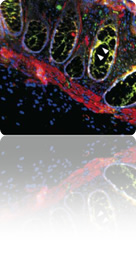

In the B cell biology research group we take advantage of standard and state-of-the-art high-throughput approaches, including high-dimensional flow cytometry, bacterial flow cytometry, antibody gene sequencing, 16S rDNA sequencing, RNA-seq, PhIP-seq and cloning-expression of human recombinant monoclonal antibodies, to address basic questions related to the biology of antibody responses in health and disease. Antibodies, also known as immunoglobulin (Igs), are somatically recombined antigen receptors expressed by B cells, a key component of the adaptive immune system along with T cells. While transmembrane Igs serve as antigen receptors on B cells, secreted Igs neutralize antigen in the fluid phase and thereafter interact with various receptors on myeloid cells involved in antigen clearance, inflammation and immune regulation.
In addition to neutralizing and clearing invasive pathogens, antibodies control the composition and immunometabolic properties of beneficial, noninvasive commensal microbes on mucosal surfaces, collectively referred to as microbiota. Central to all these protective functions is the differentiation of B cells into antibody-secreting plasma cells, which is preceded by the generation of antibody diversity.
B cell progenitors from the bone marrow generate antibody recognition diversity through Ig V(D)J gene recombination, an antigen-independent process that requires highly regulated endonucleases termed RAG1 and RAG2. Mature B cells emerging from the bone marrow colonize peripheral lymphoid organs and further diversify the antibody repertoire via Ig class switch recombination (CSR), which replaces primary IgM and IgD antibodies with secondary IgG, IgA or IgE isotypes that implement new effector functions. Moreover, mature B cells increase antibody affinity for antigen through Ig V(D)J gene somatic hypermutation (SHM), which provides B cells with the structural correlate for selection of high-affinity antibodies by antigen. CSR and SHM usually involve the activation of follicular B cells by T follicular helper cells through a slow T cell-dependent (TD) pathway that generates long-term protection and immune memory (Chen K et al., Nature Rev. Immunol. 2020). A rapid T cell-independent (TI) pathway involving splenic marginal zone B cells and other less defined B cells maximizes immune protection by providing a temporal bridge between slow adaptive immunity and early innate immunity (Chen K et al., Nature Rev. Immunol. 2020). This last pathway requires granulocytes, (Puga I et al., Nature Immunol. 2011), macrophages, dendritic cells (Grasset EK et al., Science Immunol. 2020) and/or innate lymphoid cells (Magri et al., Nature Immunol. 2014).
Our group studies the contribution of both adaptive and innate immune signals to the initiation of systemic IgM and IgG as well as mucosal IgM, IgG and IgA responses (Gutzeit C., Eur. J. Immunol. 2014; Magri et al., Curr. Opinion. Immunol. 2014). In particular, we are interested in the regulation of antibody responses that take place in the marginal zone compartment of the spleen (Chorny A. et al., J. Exp. Med. 2016; Sintes J. et al., Nature Commun. 2017) and follicular structures from the gut (Magri G et al., Immunity 2017). We also dissect the biology of a largely neglected secreted antibody, IgD, which is mostly released by unconventional IgD class-switched B cells that inhabit the nasopharingeal mucosa, including tonsils (Shan et al., Immunity 2018). Remarkably, this peculiar IgD response is dysregulated in some autoinflammatory syndromes, including a disorder of the cholesterol biosynthetic pathway known as hyper-IgD syndrome. Finally, we dissect the biology of antibody responses to SARS-Cov-2, the etiologic agent of COVID-19 (Tejedor Vaquero S. et al. Frontiers Immunol 2021; de Campos-Mata L. et al., Clin. Transl. Immunol. 2021).
Coordinator:
Andrea Cerutti(ELIMINAR)
Tel:
93 316 04 15
Fax:
93 316 04 10
Dr. Aiguader, 88
08003 Barcelona
© Institut Hospital del Mar
d'Investigacions MèdiquesLegal Notice and Privacy Policy | Cookie Policy | Site Index | Accessibility | Find Us | Contact